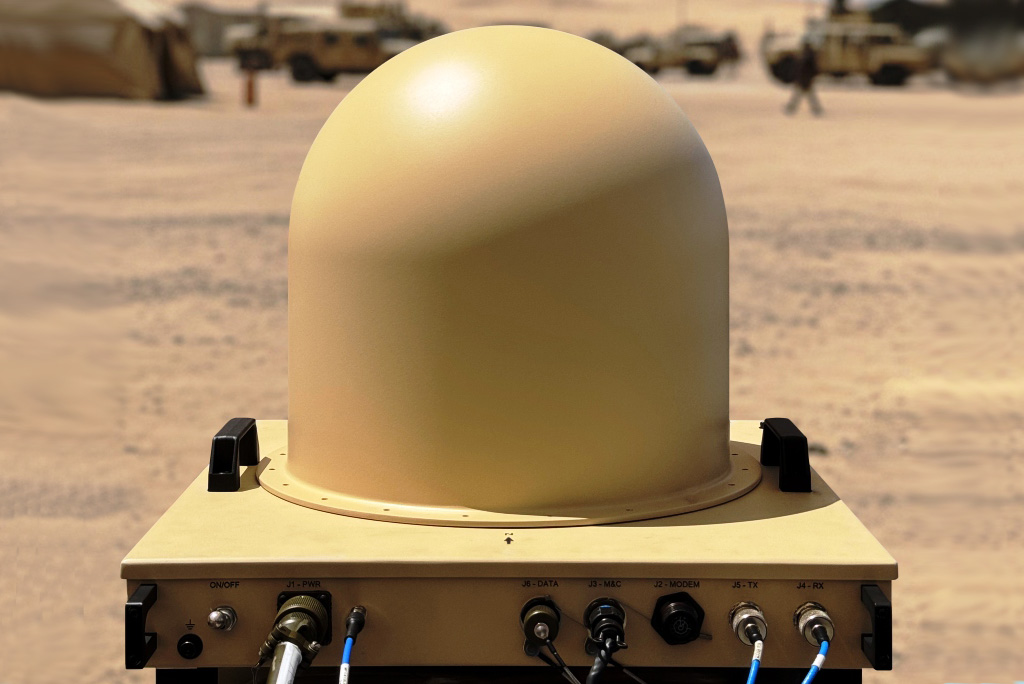Orbit Communication Systems, a leading provider of communication systems, recently announced the launch of the Multi-Purpose SATCOM (Satellite Communication) Terminal MPT30Ka SOTM (Satcom-On-The-Move)
At DSEI UK 2025, Lior Rudminsky, Vice President of Products and Solutions at Orbit Communication Systems, provided further details about the new system. The MPT30Ka has a dish diameter of 30 cm and is composed of a mixture of composite materials, 3D-printed parts, metals, and plastics. The larger variant, the MPT46Ka, has a 46 cm diameter dish and operates on the Ka radio band. The system transmitter operates on a frequency range of 29.0-31.0 GHz, its receiver operating in the 19.2-21.2 GHz frequency range.
Orbit Communication Systems attributes the improved capability of its SATCOM system to the development of a more efficient antenna, which provides higher gain while consuming less power than electrically steerable antennas, a feature essential in vehicles and units where power consumption is critical. The MPT30Ka is modem agnostic, incorporating end-user feedback to enhance plug-and-play functionality with roll-on/roll-off options. It is also compatible with military vehicles, maritime platforms, and a range of aircraft.
According to Rudminsky, the MPT30Ka’s ability to operate in GPS-denied environments is a “key factor” to operational success in the modern era. The SATCOM system can track satellites in motion in geostationary, low, medium, and high Earth orbits, switching between different networks, bands, and polarisations based on the interference detected.
The MPT30Ka utilises dynamic bandwidths, adjusting according to the type of data being transmitted, including real-time footage, data, video, and voice communications. At DSEI, Rudminsky revealed that the MPT30Ka is capable of download speeds of 130 Mbps and an upload speed of 29 Mbps.
Rudminsky stated that the MPT30Ka is equipped with state-of-the-art low-noise block-down converters, which, combined with the optical efficiency of the antenna, yield a G/T of 10.0 dB/°K at all elevation angles for the MPT30Ka and 13.5 dB/°K for the MPT46Ka; G/T, for gain-to-noise-temperature, is the measurement for a satellite antenna’s sensitivity, balancing signal-gathering ability against system noise. Furthermore, Rudminsky revealed that multiple antenna designs were assessed, and the selected antenna achieved an efficiency rate of 85% compared to standard antennas, which have an approximate efficiency rate of 60%. This provides the MPT30Ka with “world-leading efficiency,” according to Rudminsky.
Orbit Communication Systems’ MPT30Ka has an EIRP of 50.0 dBW and achieves a higher EIRP spectral density by reducing antenna side lobes, thereby focusing more signal power on the desired direction. This stronger, more efficient transmission reduces the required bandwidth and lowers monthly costs for end users; EIRP (Effective Isotropic Radiated Power) is the total transmitted power from a source, whilst EIRP spectral density shows how that power is distributed across the signal’s frequency range.
The MPT30Ka is tested and compliant with MIL-STD-188-164C, MIL-STD-810G, MIL-STD-1275, and MIL-STD-461G, ensuring that it remains operational whilst undergoing electromagnetic interference and terrain interference.
According to Rudminsky, the next steps for the MPT30Ka would be to enable the SATCOM system to operate simultaneously on Ku, Ka, and other bands, reducing the cost for the end-user both financially and in terms of platform space.
With the launch of the MPT30Ka SOTM, Orbit Communication Systems is strengthening its position in the mobile SATCOM market by delivering higher efficiency, greater resilience, and reduced operating costs for the end user. Its compliance with military standards and adaptability across air, land, and sea platforms highlights its readiness for real-world deployment. Orbit has outlined plans to develop multi-band capability across Ku, Ka, and other frequencies, which could provide users with even greater flexibility in contested environments.
Photo courtesy Orbit
